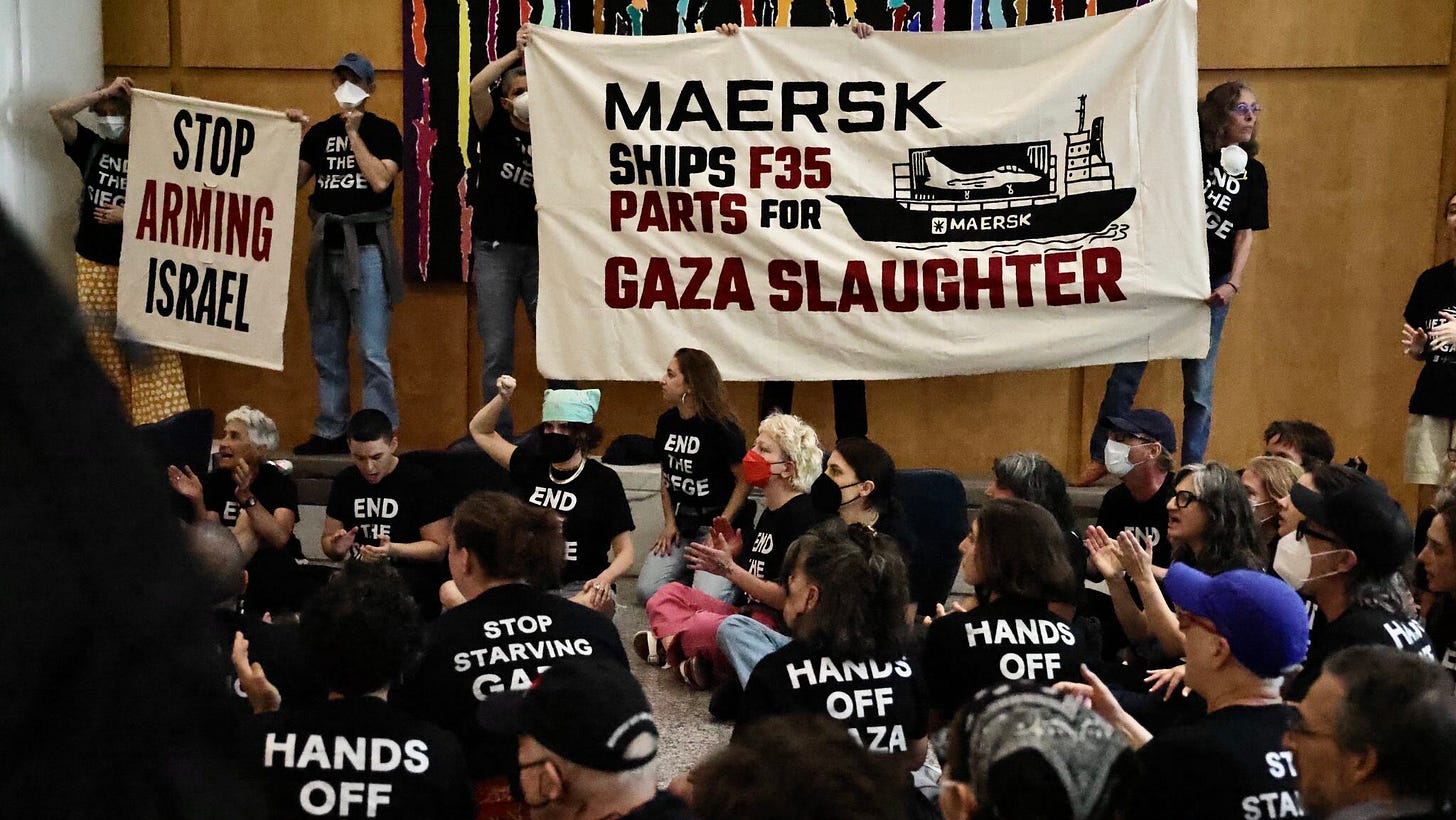Maersk Faces Growing Pressure
Shipping Giant Faces Growing Pressure as Workers Block Arms Shipments to Israel

On 11 June, hundreds of activists from Jewish Voice for Peace and the Palestinian Youth Movement (PYM) occupied the lobby of shipping giant Maersk’s headquarters in New York to protest the company’s ongoing involvement in, and support for, Israel’s genocide in Gaza. The action followed the release of a new PYM report documenting Maersk’s deep involvement in the global supply chain of F-35 fighter jets, which are routinely used to bomb schools, hospitals, and refugee camps in Palestine.
“Maersk has shipped the wings for every Israeli F-35 delivered since at least March 2022, including those for five additional Israeli F-35s scheduled for delivery by 2028,” the report states. But the company’s role extends far beyond shipping wings. Its vessels have transported a wide array of components essential to the operation and maintenance of the jets—from elements controlling doors and arms loading to fuel storage. “Without these shipments, the F-35 would not have the ability to store fuel, power its flight control systems, refuel mid-flight […] open the gun door, load bombs, or drop bombs,” the report explains.
The company’s involvement in supplying deadly cargo to the Israeli occupation predates the current genocide. In the period between late 2019 and early 2025, PYM identified 1,009 military shipments by analyzing bills of lading. These included over 400 shipments of aircraft components to Lockheed Martin, another central actor in the production of F-35s, as well as direct deliveries to infamous Israeli firms like Elbit Systems. The flow reconstructed by PYM shows that Maersk is a crucial link in the chain of delivering materials “used to manufacture, repair, and maintain fighter jets sustaining Israel’s assault on Gaza and other Palestinian territories.”
Dockworkers block arms shipments
The documents cited in the report also indicate that Maersk’s complicity is deliberate. Despite extensive documentation of the genocide, the company has continued its shipments. In some cases, it apparently even rerouted vessels after dockworkers refused to load military cargo. At the French port of Fos-sur-Mer near Marseille, dockworkers have refused to handle shipments destined for Israel on a number of occasions, most recently in April and June of this year. Following the action in April, Maersk announced that the port would be removed from one of its routes that includes Haifa and had included vessels identified by PYM as complicit in the F-35 supply chain—Nexoe and Narmada.
Maersk is not the only company involved in supplying Israel with military goods. Shipping companies and port managements across Europe have come under pressure from workers who are refusing to support the Israeli regime. Trade union chapters and grassroots collectives have staged port actions and issued strong statements asserting their refusal to be complicit. In addition to the CGT dockworkers in Fos-sur-Mer—who inspected ships for F-35 parts and blocked the loading of spare machine gun parts—workers in the Italian ports of Genoa, Salerno, and Scilla also mobilized, supported by their communities. All of these actions forced the ship Contship Era, operated by ZIM, to drift around without the intended cargo.

“In Genoa, we wanted to make it clear: our port will not be complicit in the genocide in Palestine,” stated the grassroots union Unione Sindacale di Base (USB). “When dockworkers coordinate, when workers rise up, when solidarity is organized, then it is possible to stop the flow of weapons,” USB concluded, inspiring other collectives across Mediterranean ports to follow suit and block military shipments to Israel.




